It’s time for another article about Artificial Intelligence (AI). I get asked more about AI and analytics than just about any topic – so here’s an update. Looking back, it’s hard to believe it’s been a year since I wrote my first article about Artificial Intelligence (AI), detailing how we were using AI as a force multiplier for my business. At that time, in the fall of 2023, we were nearly one year into the new era of generative AI with the launch of OpenAI’s ChatGPT. Generative AI like ChatGPT seemed to come out of nowhere for most people and quickly became one of the hottest topics of the year.
The ability of generative AI to create new content, such as text and images, by learning patterns from existing data continues to amaze (and concern) people. Although my original article wasn’t necessarily earth-shattering, it did get the attention of many, and I was asked to give some interviews and presentations about the topic. Six months later in April 2024, I wrote a follow-up article since so many people were asking for my opinion about AI for small businesses. That brings us to today’s article, which logically follows from the previous two newspaper articles.
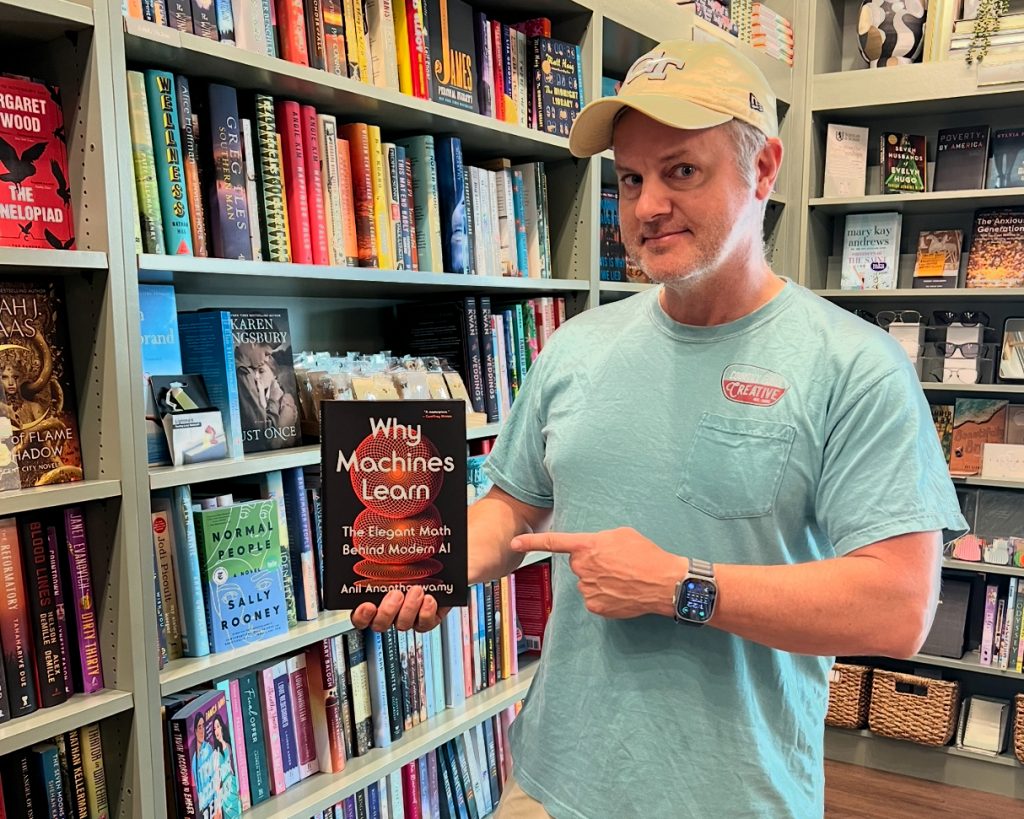
First, a bit of personal history
Before diving into my top AI book picks, I think a personal update is in order since it will provide some context for my book selections. If you’re a regular reader of my column, feel free to skip this section since you’ve read about my background in math and computer science before. If not, the following may help establish my interest and background in AI.
Like most people, I have been amazed at what generative AI can do astonishingly well, but also at what it can’t do very well. Most generative AI models are based on artificial neural networks — something that was relatively new back in the early ’90s when I first encountered them (technical note: neural nets are based on earlier concepts like Rosenblatt’s perceptron, which dates back to 1958, and McCulloch & Pitts’ artificial neuron from 1943). I dabbled in some early neural network algorithms applied to financial markets while in graduate school at Georgia State University 30+ years ago.
Over the past year, I’ve become interested in AI once again, but this time in how it is applied to digital marketing. In order to break out of the hype and get up to speed on what’s new in AI, I took some online courses through Harvard University’s excellent CS50 program, with additional courses through Wharton Business School. I’ve been so intrigued by the subject that after talking to some colleagues in academia, I decided to apply for — and was accepted to — Georgia Tech to pursue another Master’s degree, this time in analytics. I’m having a great time so far, and right off the bat, we’re already studying AI, particularly machine learning algorithms. All of my undergraduate courses in statistics, linear algebra, probability, and calculus are finally being put to the test.
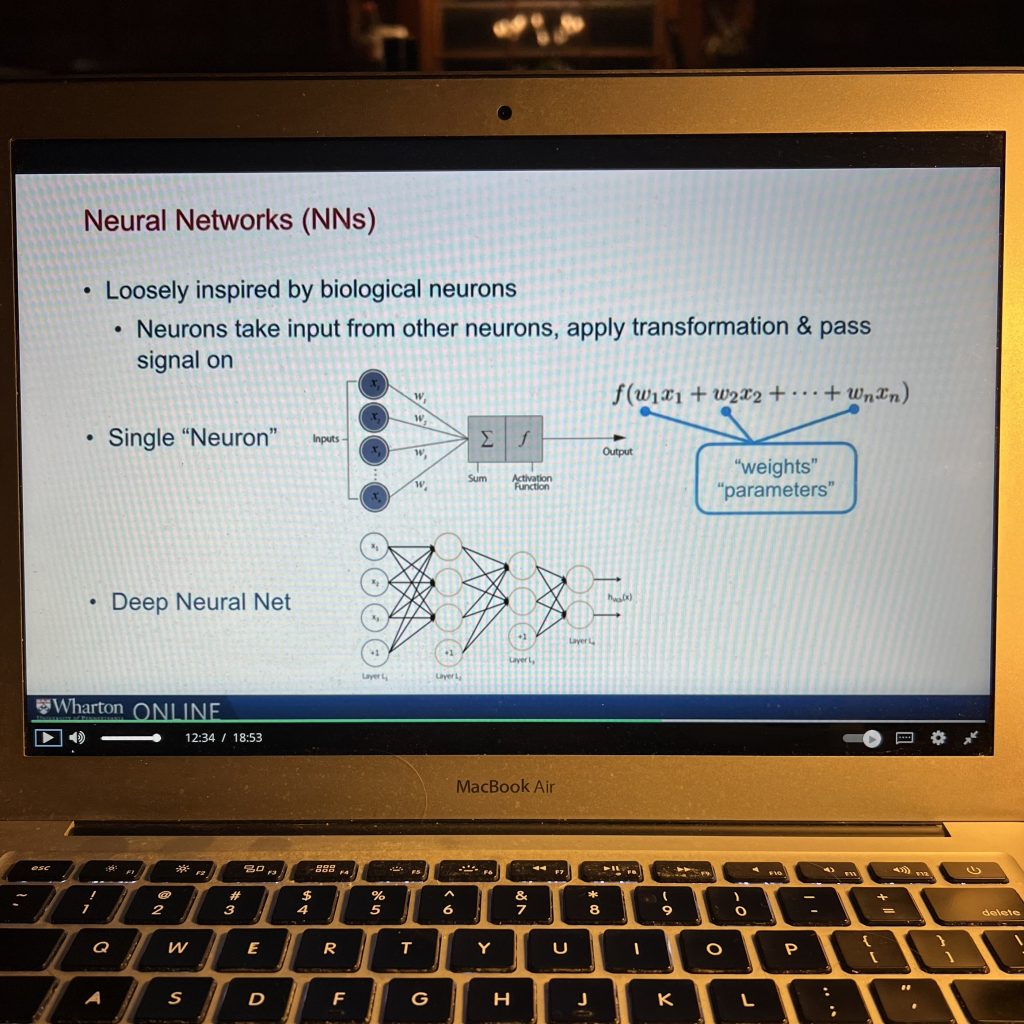
That brings me to my book picks for the year. I love to read, and I think it’s important to keep the mind sharp, not only with problem-solving but also with general reading. Once ChatGPT was out in the wild, bookshelves filled up with AI books — particularly digital bookshelves, where the barrier is low to publish something. There’s a lot of “junk” out there, some of it written 100% by AI, mostly to make a quick buck. One of the most popular AI books on Amazon right now is about how someone can become a “ChatGPT Millionaire.” Yeah, consider me skeptical.
My 2024 AI book picks were purposely selected from known academics who had a reputation before the current surge of interest in AI. Each of the authors is active in research, teaching, and communicating about AI. I’m aware there are some good books out there about AI that haven’t come from academia, but they are few and far between. Most of the authors whose books I picked don’t appear to be writing solely for financial reasons. Each of these books is available in both digital and print editions by respected publishers. All of the authors on my list are actively promoting their work, so it’s easy to find follow-up information from their research and writing.
My picks for top AI books in 2024
Co-Intelligence: The Surprising Power of Combining Human and Artificial Intelligence by Ethan Mollick (2024) Portfolio Books.
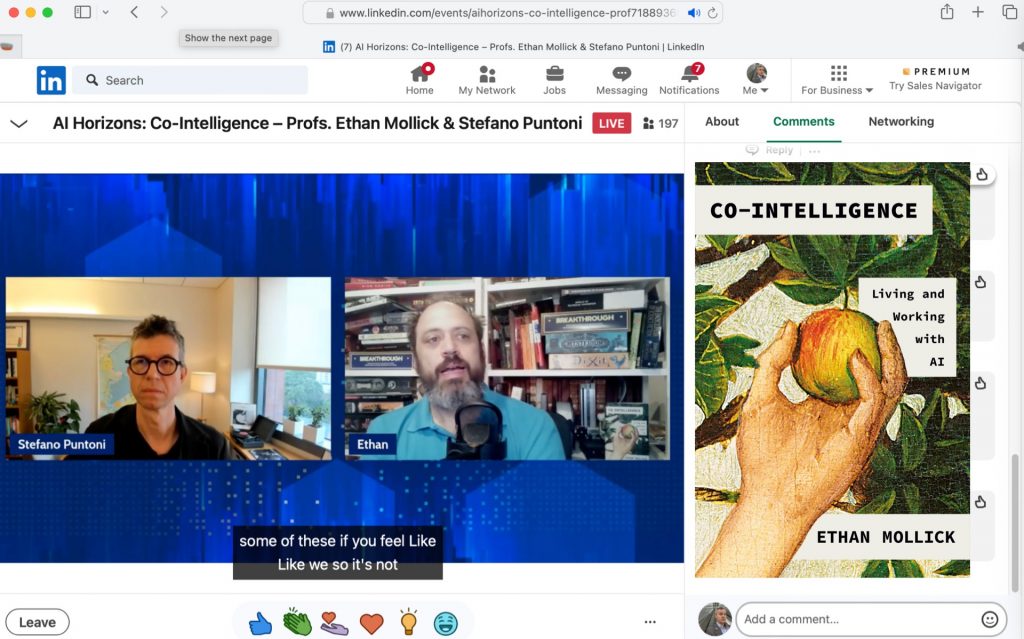
My overall top AI book pick for 2024 is Co-Intelligence by Dr. Ethan Mollick. In this book, Mollick proposes four key principles for using AI as a virtual co-worker — what he calls “co-intelligence.” These principles include always inviting AI to the table, staying human in the loop, treating AI like a person (with clear roles), and assuming today’s AI is the worst version you’ll ever use. Mollick brings these concepts to life in a way that is both practical and engaging, making this a must-read for anyone integrating AI into their work. Mollick’s blog, One Useful Thing, is also a great resource that complements the ideas from the book. This is not a technical book, although he mentions some of the underlying concepts that make AI work. If you can only read one AI book this year — this is the one.
The Worlds I See: Journeying Through AI, Humanity, and the Future of Technology by Fei-Fei Li (December 2023) Flatiron Books.
The Worlds I See by Fei-Fei Li is one of the best non-fiction books I’ve read in years. This book could easily be read for pure enjoyment — even if one isn’t particularly interested in AI. Dr. Li does an excellent job of telling personal stories with a broad view of AI’s current and future impact. Her journey from childhood to becoming a leader in the AI world is inspiring, especially for someone like me who left academia during the so-called “AI winter” of the early ’90s and is now witnessing AI’s resurgence. This book offers a behind-the-scenes tour into the key technologies of AI and, more importantly, the people involved in them. Much like the book Chaos: The Making of a New Science did for me in the ’80s, The Worlds I See reawakens that sense of wonder about the future of AI. Dr. Li, often called the “Godmother of AI” for her ground-breaking work in image recognition, remains active in the field — particularly with ethics in AI.
The AI-Savvy Leader: Nine Ways to Take Back Control and Make AI Work for You by David De Cremer (2024) Harvard Business Review Press.
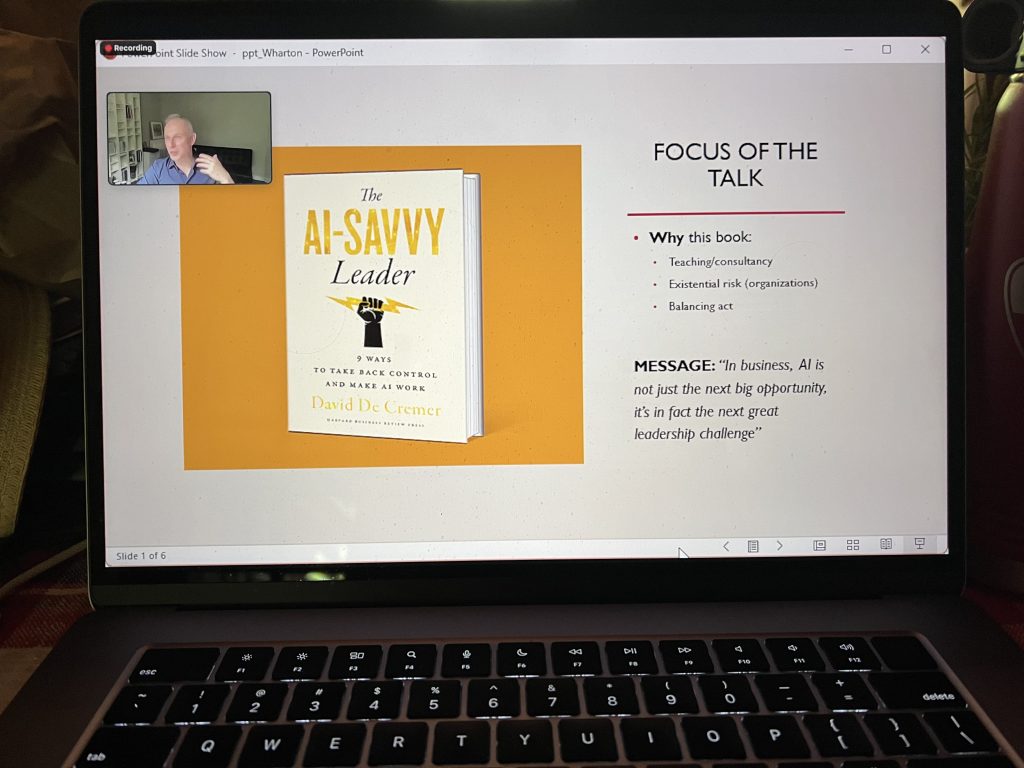
Professor David De Cremer’s The AI-Savvy Leader offers a much-needed human-centric perspective on AI. While many books focus solely on the technology, De Cremer shifts the spotlight to the leaders responsible for steering AI implementation. He outlines nine actionable strategies to help leaders maintain control over AI’s integration into their businesses, with an emphasis on ethical considerations and fostering a learning culture. As a business owner, I appreciated how the book reinforces the importance of strong leadership in the AI era. AI can’t replace vision, integrity, or adaptability — it enhances them. This non-technical book is a must-read for any executive looking to leverage AI while staying true to core values.
Teaching with AI: Humanizing Learning in the Age of Artificial Intelligence by Jose A. Bowen & C. Edward Watson (2024) Johns Hopkins University Press.
Teaching with AI is a timely read, especially for educators looking to integrate AI into their classrooms. I appreciated the practical examples, sample prompts, and activities tailored for both teachers and students. Bowen’s and Watson’s intent is to make it easier to use AI in meaningful and accessible ways in the classroom. While some sections were a bit redundant (which may have been intentional, since that’s one way to learn), the overall content is highly valuable. As both an instructor and a student, I found this book personally relevant. For educators who still ban AI in classrooms, it’s time to reconsider. AI offers opportunities for mutual benefit to both teachers and students. Though the world of AI is rapidly evolving, Bowen and Watson do a great job of incorporating the latest research and technologies. Ironically, just after this book’s publication, Google released its NotebookLM AI offering for learning. Keep in mind that innovations are going to happen, and books will have a hard time keeping up. Consider following the authors on this list via social media and blogs to stay updated on their perspectives as new technologies emerge.
Why Machines Learn: Exploring the Boundaries of Artificial Intelligence by Anil Ananthaswamy (2024) Penguin Random House.
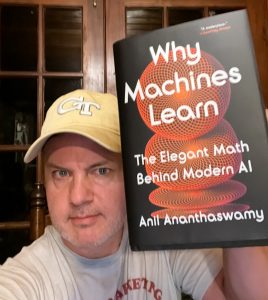
I’m still reading Why Machines Learn, but so far, it’s one of the best books I’ve read on the subject of AI. This book is likely to become my new favorite about AI once I finish it. Ananthaswamy’s book combines both the history of AI and the underlying math that makes it work. I’m a math nerd at heart, so this book speaks my language. Ironically, Ananthaswamy is the only author on my list who doesn’t have a PhD, but his book is the most academic and technically detailed of the bunch. He explores key mathematical and scientific concepts — like linear algebra, statistics, and calculus — that are the backbone of AI, and does so in a way that’s both accessible and thorough. This book is highly recommended for those with a technical background or a strong interest in STEM. In fact, it’s so comprehensive I think it could easily serve as an introductory undergraduate textbook on AI. I purchased this book as a print edition from my local bookstore, Scholar & Scribe in Fayetteville/Trilith.
Please support local bookstores when you can, even if they have to order THE books for you.
Honorable mentions
The following two books were published before 2024 but have aged quite well and are still worth reading.
Artificial Intelligence: A Guide for Thinking Humans by Melanie Mitchell (2019) Farrar, Straus and Giroux.
Dr. Mitchell is a Professor with the Santa Fe Institute and Originator of the Complexity Explorer platform, where I took some online courses about complexity science back in 2015 and 2016. Mitchell is an excellent communicator, both in class and in this fine book about AI. Her book was one of the first mainstream works to get really popular — and it did so well before ChatGPT came out. The book provides a great history of AI and explores topics that are still very relevant today. Mitchell has a healthy skepticism about some of AI’s purported capabilities, and her doubts are grounded in real-world research and experience. Much has happened since this book came out, and I understand it may be in the process of being updated. Also highly recommended is her award-winning book Complexity: A Guided Tour (2009) Oxford University Press.
A Human’s Guide to Machine Intelligence: How Algorithms Are Shaping Our Lives and How We Can Stay in Control by Kartik Hosanagar (2019) Viking.
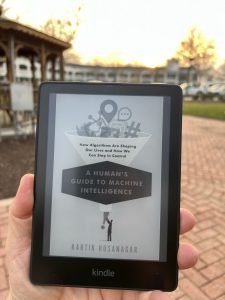
Earlier this year, I took Professor Hosanagar’s online course, Artificial Intelligence in Business, through Wharton Business School. It’s an outstanding course, and I highly recommend it to all business leaders. I enjoyed the course so much that I was inspired to read Hosanagar’s book. Although it was written before ChatGPT’s release, the material has aged very well, and the points made are still relevant — perhaps even more so today. Hosanagar has an easy-going writing style with a good sense of humor — something you don’t often find in books on AI. I’m hoping he writes another book soon, and I’ll definitely buy it if he does.
On my future reading list
I have three more books about AI that have been recommended to me and are on my list to read next. Now that I’m back in graduate school, I might have to slow down the rate at which I read these books, but I do intend to get to them in the next few months.
- AI & I: An Intellectual History of Artificial Intelligence by Eugene Charniak (2024) MIT Press.
- How to Teach AI: Weaving Strategies and Activities Into Any Content Area by Rachelle D. Poth (2024) International Society for Technology in Education (ISTE).
- Nexus: A Brief History of Information Networks from the Stone Age to AI by Yuval Noah Harari (2024) Penguin Random House.
Summary
Read more books! It’s not lost on me that there are plenty of online articles, YouTube videos, and free courses about AI. I’d like to make the case that you supplement your AI diet with some longer-form content by reading good books on the subject. Avoid books that only appear in online form or have an author who doesn’t seem to have an online presence before 2023 (one of the many ways to spot a “fake” book).
Each of my book recommendations is highly readable, comes from a respected authority, and explores different aspects of AI — history, algorithms, applications, ethics, learning, and even math. You’ll notice that some of the authors seem to be “pro-AI,” while others are a little less enthusiastic. It’s good to have a variety of perspectives on things — including AI. None of the authors think AI is going to take over the world, and neither do I — but we are in for some interesting times.
Have you read any good books on AI this year that you think I should add to the list? I’d love to hear your feedback below or on my goodreads page.
NOTE – A slightly different version of this article was published on my personal blog as My Top Picks of Books about AI for 2024 (https://blog.marketingdatascience.ai)
[Joe Domaleski, a Fayette County resident for 25+ years, is the owner of Country Fried Creative – an award-winning digital marketing agency located in Peachtree City. His company was the Fayette Chamber’s 2021 Small Business of the Year. Joe is a husband, father of three grown children, and proud Army veteran. He has an MBA from Georgia State University and enjoys sharing his perspectives drawing from thirty years of business leadership experience. Joe is a recipient of the Peachtree City Rotary Club Business Leader of the Year Award for 2024. Sign up for the Country Fried Creative newsletter to get marketing and business articles directly in your inbox. You can connect with Joe directly on LinkedIn or follow his new blog Marketing Data Science for more insights and updates.]









Leave a Comment
You must be logged in to post a comment.